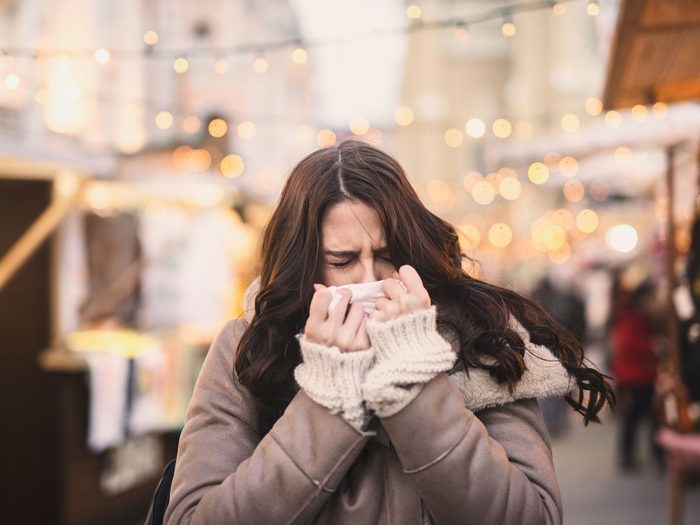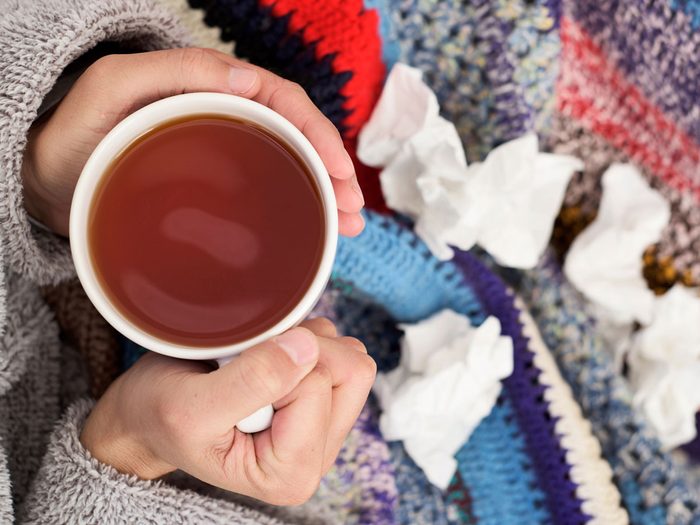
Influenza Can Make You Seriously Sick
It’s that time of year again—when everyone seems to have a runny nose and cough. But the flu is more than just the common cold. Influenza and pneumonia are listed in the top 10 leading causes of death in Canada. Every year the flu results in approximately 12,200 hospitalizations and 3,500 deaths. And it often hits the most vulnerable the hardest. But there are ways to protect yourself and your loved ones.

Last Year’s Flu Was Bad
Last year (and the year before) were particularly bad for hospitalizations and deaths in Canada thanks to the predominant strain H3N2, which typically affects seniors, says Dr. Michelle Murti of Public Health Ontario. Most seniors were not exposed to the H3N2 strain when they were younger, so it causes a very significant immune response and can make anyone elderly quite sick.
Check out this map to determine when the flu will hit your province.

Predictions Aren’t a Sure Thing
The predominant flu strains change every year. While health organizations can sometimes predict outcomes for the Northern Hemisphere by looking at trends in the Southern Hemisphere, such as flu cases in Australia, it’s never a sure thing. “We never really know,” says Dr. Murti. “It’s a bit of an early guessing game. The flu is an unpredictable disease and we always get a little bit surprised each year.” While Australia had a less severe season this winter, dealing mostly with the strain H1N1, which doesn’t affect seniors as badly, that doesn’t mean that our season will follow suit.
Not sure if you have a cold or the flu? Here’s how to tell.

Seniors and Children Are Most at Risk
The most susceptible groups to complications from the flu are anyone 65 and older, and children particularly under the age of two, but any children under the age of five. Also, those with underlying health conditions, such as asthma, heart disease, lung disease, diabetes or a compromised immune system are more vulnerable to secondary illnesses or infections caused by the flu virus.

Flu Is Extremely Contagious
Flu is a respiratory virus spread through droplets in the air. When someone who is sick coughs or sneezes, the virus particles can travel up to six feet away. (Yuck!) While people typically get the flu from personal contact, it can also spread through touching contaminated surfaces. “Flu virus can live on surfaces for even as long as a couple days [after someone with the flu has touched it],” says Dr. Murti. That’s a good reminder to wash your hands throughout the day and avoid touching your mouth or eyes. (These are the most germ-infested things you touch on a regular basis.)

You Can Have The Flu and Not Be Sick
“People can be contagious, shedding the virus, even a day before they show symptoms themselves,” says Dr. Murti. If you feel like you’re getting sick, stay home. If you do fall ill, avoid spreading the virus to those around you by washing your hands thoroughly, avoiding contact with others, and cleaning commonly touched surfaces to make sure you’re not unintentionally spreading virus particles. Don’t miss these signs you should call in sick to work.

Not Everyone Has The Same Symptoms
The flu also doesn’t always present the same way, says Dr. Murti. While a young child may get a fever, seniors may not have typical symptoms, so they might not know they have the flu. The flu in a senior might mean they aren’t able to manage on their own the way they usually do and they may not rebound as quickly, or at all.
Essential oils may be help you feel more relaxed. Here’s how to create a stress-busting blend.

You Can Infect Someone Vulnerable
Everyone aged six months or older is eligible for a free flu vaccine. It’s recommended for people in high-risk groups such as pregnant women, children under five, people over 65, and anyone who works or lives with people who are also in the vulnerable category, says Dr. Murti. For example, if you have a baby under the age of six months and they can’t get immunized yet, everyone around them should be vaccinated to help protect them. While “the vaccine is only generally 40 to 60 percent effective” it provides good protection and the more people who get it the better the community immunity, says Dr. Murti. Here are seven myths about the flu shot, busted.

Your Heart Attack Risk Rises
A new Canadian study published in the New England Journal of Medicine showed that the risk of having a heart attack is six times higher the week after having influenza. “Flu can really exacerbate underlying health conditions,” says Dr. Murti. The researchers reinforced the importance of seeing a doctor if you have any heart symptoms the week after a respiratory infection and the importance of the flu vaccine for anyone at risk. “Flu can be a much more serious illness than people think,” says Dr. Murti.

You Or A Loved One Could End Up Hospitalized
In some cases, the flu virus gets seeded into the lungs and causes a serious respiratory infection and even a secondary bacterial infection like pneumonia. That may result in hospitalization or the need for medical support. If your symptoms aren’t improving after a few days or you’re feeling worse, see a doctor to get evaluated.
Be sure to wash your hands often when you’re visiting the hospital. These are the 10 places with the most germs.
